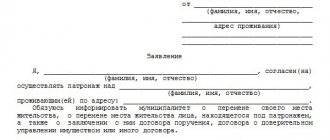Home / Real estate / Purchasing real estate / Housing exchange
Back
Published: 01/28/2018
Reading time: 7 min
0
758
When exchanging a room, an exchange agreement is drawn up. The consent of neighbors and sometimes guardianship authorities or husband/wife is required.
- What legal document governs it?
- Registration procedure Room exchange with additional payment
- Exchange of a room in a communal apartment
Rooms are changed for various reasons. For example, due to a desire to improve living conditions or change his place. Exchange is also used when exchanging apartments. But in any case, it is important to formalize the deal correctly.
What legal document governs it?
When exchanging property, including real estate, an exchange agreement is drawn up. It is regulated by Chapter 31 of the Civil Code. In particular, paragraph 2 of Article 567 states that the same rules apply to such contracts as in the case of coolie sale . Of course, only if this does not contradict the legislation on exchange.
Is it possible to exchange living space in a communal apartment or dormitory?
In order to safely and profitably, without wasting time, it is important to understand how to do this, who has the right to exchange, and what necessary conditions must be taken into account in a real estate transaction.
Who has the right to this?
The owners have the right to make a room exchange transaction. If the room is not privatized, then an exchange is possible after receiving acceptance from the executive body of the municipality.
What conditions must be met?
It is necessary to obtain the consent of neighbors registered in a communal apartment; sometimes permission from the guardianship authorities may be required if the owners include a child, as well as a husband or wife. If the apartment is not privatized, then it is from the municipal authorities. You should worry about all this in advance.
Important. Objects of exchange should not be under encumbrance or arrest.
Registration procedure
Before starting transactions on the market, you must offer to buy the room to other owners. Moreover, the conditions for them cannot be less favorable than for a further transaction. If the offer was made at an inflated price, the exchange can be challenged in court.
The refusal to purchase must be certified by a notary. If the neighbors refuse to buy a room, but also do not agree to third-party transactions, they need to send an offer by registered mail with a list of the contents. If there is no response after a month, you can start the exchange.
Next, you need to find the owner of the room or apartment who agrees to the exchange. In the latter case, most likely, you will get an exchange with an additional payment (to the owner of the room). If the housing is of equal price, no additional payment will be required.
Then an exchange agreement is drawn up and signed.
If the room is not in a communal apartment, but in an ordinary one, it is in shared ownership. And all transactions with real estate shares must be certified by a notary.
The owner (or one of them) may also be a child. In this case, you will need to obtain the consent of the guardianship authorities. To do this, you need to contact the territorial office with a contract and technical documentation for housing. The staff will decide whether the child’s situation will worsen. The answer is usually given within two weeks.
Ownership of new housing is transferred only after registration with Rosreestr. You must submit an application to any branch. Both parties will need to be present.
To save time, you can do this by mail or via the Internet, and also make an appointment for a specific time. They also accept documents through the MFC. Three days later (from the moment Rosreestr receives the documents) you can receive an extract of ownership of the new room.
Room exchange with extra charge
If real estate objects differ significantly in price, the owners agree on an additional payment. It can be paid:
- cash;
- in non-cash form;
- maternity capital (subject to other rules relating to its use).
The amount and procedure for payments must be specified in the contract. If funds are not transferred upon signing an agreement, an acceptance certificate, receipt, etc. is drawn up.
Exchange of a room in a communal apartment
If the apartment is communal, you will also need to obtain permission to move in a new neighbor.
If some of the rooms are not privatized, their owner is the state. Then permission will have to be obtained from the local administration.
How to exchange a share in an apartment?
A more serious and problematic situation is the desire to exchange shared ownership, especially if one of the owners is a child. Since most of our exchanges are made through sales, let’s talk about this method. From a legal point of view, there are no obstacles to performing such a procedure. However, it is hardly possible to find a real buyer for the share. Therefore, it makes more sense here to agree with other owners on the sale of the entire apartment, and only then everyone will receive their share, expressed in monetary terms, and purchase separate housing (make a down payment on the mortgage, etc.).
There is another option - to offer the remaining co-owners to buy out your part of the living space. Moreover, they already have a preemptive right to this. This alternative is quite acceptable, mainly in cases where there are not very many owners, for example, 2 or 3. Finally, a common practice is the intention to move in with relatives who own shares in different apartments and even cities. The solution to the problem occurs through the conclusion of two gift agreements, which do not require the consent of the remaining co-owners. You will simply give each other equal shares and calmly move to a new home.
When talking about how to exchange a child’s share in an apartment, it is necessary to take into account a number of subtleties. Until the age of 18, minors and minors do not have full legal capacity, but they can own real estate. Accordingly, they have the right to buy it, donate it, or rent it out only with the consent of the guardianship and trusteeship authorities. Permission is issued to parents (if they exist), meaning their approval is first required.
Important points:
- no deterioration of living conditions (reduction of area, registration of additional people, etc.);
- transfer of funds to a bank account.
If the child is under 14 years of age, the purchase and sale agreement is signed by a legal representative. If the person is older, then he signs it himself.
List of required documents
First of all, you need a properly drafted contract. It must indicate:
- Full name and passport details of the parties (owners and authorized representatives, if they represent anyone).
- Information about the rooms: footage, in which apartment (address, number of floors, area, cadastral number) they are located.
- On what basis does it belong (privatization, purchase, inheritance, etc.) and the number of the corresponding document.
- Is there an additional payment and, if so, how is it paid (cash or bank transfer).
- By what time should the room be vacated?
- Date of signing.
There may be other clauses in the contract. In addition to this, you will need the following documents:
- Certificate of ownership of the room (or extract from the Unified State Register of Real Estate).
- The document on the basis of which this right arose.
- Cadastral and/or technical passport.
- Refusal to purchase by owners of other rooms.
And in some situations additional ones will be needed:
- Permission from guardianship authorities.
- Consent of husband or wife.
- Consent to move in (from neighbors in a communal apartment).
- Power of attorney issued to a representative.
- And others.
What are the difficulties?
Resolving the issue on your own does not always lead to a positive result, because this process is extremely long and difficult. While you are trying to exchange a room for an apartment, certain pitfalls may await you:
- you misunderstood the buyer and received a smaller amount, which is not enough for the apartment;
- the seller suddenly and without warning raised the expected price;
- agreements on terms were violated, which left you without housing at all for some time;
- the documents were executed with violations;
- there are people registered in the apartment who cannot be removed from the register even in court;
- the seller is not the owner of the property;
- the apartment turned out to be non-privatized, etc.
Legal assistance from the specialists of the agency “Your Apartment” will allow you to avoid these and other troubles. They carry out all transactions quickly, easily and efficiently, regardless of their complexity. In the shortest possible time and on favorable terms for you, we will implement the exchange with or without additional payment, with the involvement of a mortgage, congress, travel and much more. The safety of the procedure is carefully checked by our qualified staff. In addition, all stages will be accompanied by legal support and professional advice of any kind.
Where to contact?
The room needs to be prepared accordingly before being exchanged, and it's not just about appearance. Contact the other owners for written consent to barter . Your spouse should do the same. After this, if there are people registered in the premises other than the immediate owners, try to sign them out.
After this, you can contact a real estate agency or search on your own.
True, in the latter case, it may drag on, since you do not have the appropriate database in order to quickly select an option .
After a client has been found, organizational issues need to be resolved with him.
You show each other real estate properties, look for compromises, agree to exchange with or without additional payment.
After this, it is time to draw up the contract and sign it. You can do this yourself , or you can contact a notary .
The latter option is safer if you are not entirely sure of your opponent's good intentions.
Risks
Despite the reliability of exchange transactions, they also have specific risks. It can be quite difficult to find a candidate with a suitable living space, which significantly increases the exchange time.
Important. When exchanging, there is a danger of challenging and even canceling the exchange agreement if someone's necessary consent was not obtained in time.
Fraud is also possible, so you should carefully check the legal “purity” of the objects of exchange. It is better to do everything with the help of a specialist from a real estate agency.
Trading a room for an apartment or a separate house is a great way to improve your quality of life. Provided the transaction is completed correctly, you will be guaranteed against any fraud. The exchange agreement is essentially not much different from a standard purchase and sale agreement.
Reasons for the exchange
There can be many reasons for an exchange. There are both the most ordinary and the most extraordinary reasons why such a complex legal action is carried out. Let's get acquainted with the statistics and consider the main exchange actions, as well as the reasons for them:
- Divorce . When dissolving a marriage, the spouses no longer wish to live in the same territory. And yet, sometimes, citizens cannot afford to exchange their housing for two less. Exchanging premises is a way out of this situation.
- An exchange may be necessary when residents want to significantly improve their living conditions , for example, instead of one premises, take ownership of a one-room apartment. Barter is also possible in this situation.
- Sometimes work or other circumstances require moving to another area or even to a city . In this regard, it is also necessary to exchange.
What laws govern it?
In our country you can exchange any movable or immovable things of which you are the owner . Of course, to carry out such an action there is a special regulatory act, which is called the Civil Code.
It reflects all the circumstances on the basis of which transactions involving barter take place. An entire chapter is devoted to the barter agreement, and you can separately familiarize yourself with this concept in Article 567 of the Civil Code.
Bartering with rooms is not prohibited by the Housing Code. He talks in Article 72 of the Housing Code of the Russian Federation about the issues of social hiring and exchange of real estate under this agreement , so if there is no privatization, you can turn to this regulatory act for clarification.
Judicial practice, which you can easily find on the Internet, can be of great benefit. Court decisions are also sources of law and can enlighten you on certain controversial issues. Decisions on room barter issues can be found on the website of the nearest district court .
Find out on our website how to exchange two-room apartments, housing purchased with a mortgage, as well as whether it is possible to exchange premises for a house and land.
Terms and cost of registration
Registration of a new certificate of ownership lasts from seven working days to one month, depending on the individual characteristics of your transaction.
Typically, the time for consideration is specified at the time of submission of documents.
The exchange tax can be paid
The cost of the duty is equal to 13 percent of the transaction for citizens of our country. If you are a foreign citizen, get ready to fork out 20 percent.









